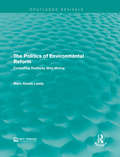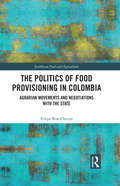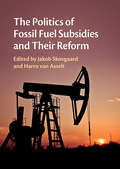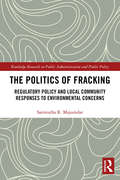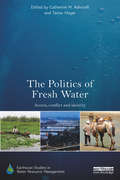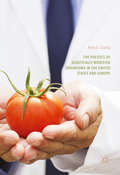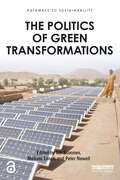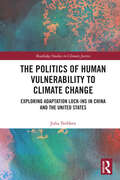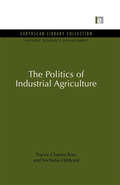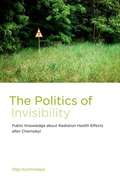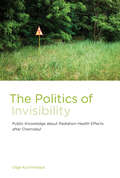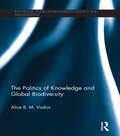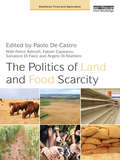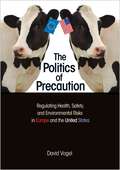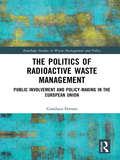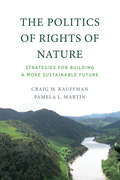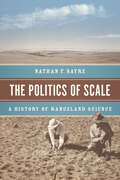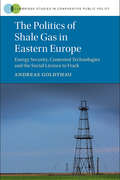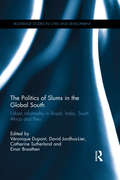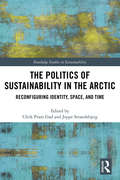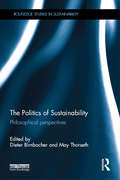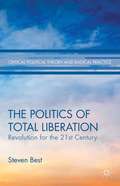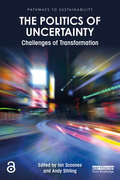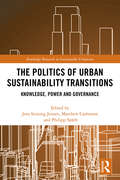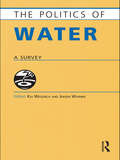- Table View
- List View
The Politics of Environmental Reform: Controlling Kentucky Strip Mining (Routledge Revivals)
by Marc Karnis LandyThe Politics of Environmental Reform demonstrates how environmental laws affect local governments with Kentucky strip mining as its core example. Originally published in 1976, Landy’s research into environmental legislation in a state whose economy relies on the coal industry can easily be applied to all forms of government shedding light on issues such as policy initiation, federal-state relations and regulatory performance. This title will be of interest to students of Environmental Studies and professionals.
The Politics of Food Provisioning in Colombia: Agrarian Movements and Negotiations with the State (Earthscan Food and Agriculture)
by Felipe Roa-ClavijoThis book explores food provisioning in Colombia by examining the role and impact of the agrarian negotiations which took place in the aftermath of the 2013–2014 national strikes. Most of the research in the field of agrarian studies in Colombia has focused on inequalities in land distribution, the impacts of violent conflict, and most recently, the first phase of the peace agreement implementation. This book links and complements these literatures by critically engaging with an original framework that uncovers the conflicts and politics of food provisioning: who produces what and where, and with what socio-economic effects. This analytical lens is used to explain the re-emergence of national agrarian movements, their contestation of the dominant development narratives and their engagement in discussions about food sovereignty with the state. The analysis incorporates a wide range of voices from high-level government representatives and leaders from national agrarian movements. Their narratives of food provisioning and the broader role of the food industry are reviewed and the key findings show an underlying conflict within food provisioning based on the struggle of marginalised smallholders to develop alternative agri-food systems that can be included in the local and domestic food markets in the context of a state dominated by an export and import approach. Overall, the book argues that the battle ground of agrarian conflicts has moved to the fi eld of food provisioning and using this approach has the potential to reframe the debate about the future of food and agriculture in Colombia and beyond. This book will be of great interest to students and scholars of food and agriculture, rural development, peasant studies, and Latin American Studies.
The Politics of Fossil Fuel Subsidies and Their Reform
by Jakob Skovgaard Harro Van AsseltFossil fuel subsidies strain public budgets, and contribute to climate change and local air pollution. Despite widespread agreement among experts about the benefits of reforming fossil fuel subsidies, repeated international commitments to eliminate them, and valiant efforts by some countries to reform them, they continue to persist. This book helps explain this conundrum, by exploring the politics of fossil fuel subsidies and their reform. Bringing together scholars and practitioners, the book offers new case studies both from countries that have undertaken subsidy reform, and those that have yet to do so. It explores the roles of various intergovernmental and non-governmental institutions in promoting fossil fuel subsidy reform at the international level, as well as conceptual aspects of fossil fuel subsidies. This is essential reading for researchers and practitioners, and students of political science, international relations, law, public policy, and environmental studies. This title is also available as Open Access.
The Politics of Fracking: Regulatory Policy and Local Community Responses to Environmental Concerns (Routledge Research in Public Administration and Public Policy)
by Sarmistha R. MajumdarOver the last decade, the oil and gas industry has garnered a lot of support from the United States federal and state governments in the name of energy independence and economic prosperity. More specifically, hydraulic fracturing or fracking is said to not only make the production of affordable energy possible but also reduce emissions of carbon dioxide by substituting coal with natural gas in the utility sector. Behind the façade of many socio-economic and political benefits, the process of fracking causes serious environmental concerns. Dismissing the negative externalities of fracking simply raises the question, to what extent have communities close to fracking sites been adversely impacted by it? In this book, Sarmistha R. Majumdar studies four communities close to fracking well sites in Texas to help illustrate to what extent fracking regulations have been developed in Texas and how effective these regulations have been in safeguarding the interests of individuals in local communities amidst the lure of economic gains from the extraction of oil and natural gas from shale formations. Majumdar has developed a model to show stage by stage community actions to regain their quality of life and the consequences of their actions, if any, on state and local regulations and ordinances, and the oil and gas industry. This book will be an important resource for scholars of environmental and natural resource politics and policy in the United States.
The Politics of Fresh Water: Access, conflict and identity (Earthscan Studies in Water Resource Management)
by Catherine M. Ashcraft Tamar MayerWater scarcity is not simply the result of what nature has to offer but always involves power relations and political decisions. This volume discusses the politics of the freshwater crisis, specifically how access to water is determined in different regions and historical periods, how conflict is constructed and managed, and how identity and efforts to control water systems, through development, technologies, and institutions, shape one another. The book analyzes responses to the water crisis as efforts to mitigate water insecurity and as expressions of collective identity that legitimate, resist, or seek to transform existing inequalities. The chapters focus on different processes that contribute to freshwater scarcity, including land use decisions, pollution, privatization, damming, climate change, discrimination, water management institutions and technology. Case studies are included from North and South America, Africa, Asia, Europe and New Zealand.
The Politics of Genetically Modified Organisms in the United States and Europe
by Kelly A. ClancyThis book examines the puzzle of why genetically modified organisms continue to be controversial despite scientific evidence declaring them safe for humans and the environment. What explains the sustained levels of resistance? Clancy analyzes the trans-Atlantic controversy by comparing opposition to GMOs in the United Kingdom, Germany, Poland, Spain, and the United States, examining the way in which science is politicized on both sides of the debate. Ultimately, the author argues that the lack of labeling GMO products in the United States allows opponents to create far-fetched images of GMOs that work their ways in to the minds of the public. The way forward out of this seemingly intractable debate is to allow GMOs, once tested, to enter the market without penalty—and then to label them.
The Politics of Green Transformations (Pathways to Sustainability)
by Peter Newell Ian Scoones Melissa LeachMultiple ‘green transformations’ are required if humanity is to live sustainably on planet Earth. Recalling past transformations, this book examines what makes the current challenge different, and especially urgent. It examines how green transformations must take place in the context of the particular moments of capitalist development, and in relation to particular alliances. The role of the state is emphasised, both in terms of the type of incentives required to make green transformations politically feasible and the way states must take a developmental role in financing innovation and technology for green transformations. The book also highlights the role of citizens, as innovators, entrepreneurs, green consumers and members of social movements. Green transformations must be both ‘top-down’, involving elite alliances between states and business, but also ‘bottom up’, pushed by grassroots innovators and entrepreneurs, and part of wider mobilisations among civil society. The chapters in the book draw on international examples to emphasise how contexts matter in shaping pathways to sustainability Written by experts in the field, this book will be of great interest to researchers and students in environmental studies, international relations, political science, development studies, geography and anthropology, as well as policymakers and practitioners concerned with sustainability.
The Politics of Human Vulnerability to Climate Change: Exploring Adaptation Lock-ins in China and the United States (Routledge Studies in Climate Justice)
by Julia TeebkenThis book compares how the social consequences of climate change are similarly unevenly distributed within China and the United States, despite different political systems. Focusing on the cases of Atlanta, USA, and Jinhua, China, Julia Teebken explores a set of path-dependent factors (lock-ins), which hamper the pursuit of climate adaptation by local governments to adequately address the root causes of vulnerability. Lock-ins help to explain why adaptation efforts in both locations are incremental and commonly focus on greening the environment. In both these political systems, vulnerability appears as a core component along with the reconstitution of a class-based society. This manifests in the way knowledge and political institutions operate. For this reason, Teebken challenges the argument that China’s environmental authoritarian structures are better equipped in dealing with matters related to climate change. She also interrogates the proposition that certain aspects of the liberal democratic tradition of the United States are better suited in dealing with social justice issues in the context of adaptation. Overall, the book’s findings contradict the widespread assumption that developed countries necessarily have higher adaptive capacity than developing or emerging economies. This volume will be of great interest to students and scholars of climate justice and vulnerability, climate adaptation and environmental policy and governance.
The Politics of Industrial Agriculture (Natural Resource Management Set)
by Nicholas Hildyard Tracey Clunies-RossIn the last forty years, agriculture in the industrialised countries has undergone a revolution. That has dramatically increased yields, but it has also led to extensive rural depopulation; widespread degradation of the environment; contamination of food with agrochemicals and bacteria; more routine maltreatment of farm animals; and the undermining of Third World economies and livelihoods through unfair trading systems. Confronted by mounting evidence of environmental harm and social impacts, mainstream agronomistis and policy-makers have debatedly recognized the need for change. 'Sustainable agricultutre' has become the buzz phrase. But that can mean different things to different people. We have to ask: sustainable agriculture for whom? Whose interests are benefiting? And whose are suffering? At issue is the question of power – of who controls the land and what it produces. Most of the changes currently under discussion will actually strengthen the status quo and the underlying causes of the damage. The result will be greater intensification of farming, environmental destruction and inequality. There are no simple off-the-shelf alternatives to industrial agriculture. There are, however, groups throughout the world, who have contributed to this report and who are working together on a new approach. An agriculture that, in Wendell Berry's words, 'depletes neither soil nor people'. Originally published in 1992
The Politics of Invisibility
by Olga KuchinskayaBefore Fukushima, the most notorious large-scale nuclear accident the world had seenwas Chernobyl in 1986. The fallout from Chernobyl covered vast areas in the Northern Hemisphere,especially in Europe. Belarus, at the time a Soviet republic, suffered heavily: nearly a quarter ofits territory was covered with long-lasting radionuclides. Yet the damage from the massive falloutwas largely imperceptible; contaminated communities looked exactly like noncontaminated ones. Itcould be known only through constructed representations of it. In The Politics ofInvisibility, Olga Kuchinskaya explores how we know what we know about Chernobyl,describing how the consequences of a nuclear accident were made invisible. Her analysis shedsvaluable light on how we deal with other modern hazards -- toxins or global warming -- that arelargely imperceptible to the human senses. Kuchinskaya describes the production ofinvisibility of Chernobyl's consequences in Belarus -- practices that limit public attention toradiation and make its health effects impossible to observe. Just as mitigating radiologicalcontamination requires infrastructural solutions, she argues, the production and propagation ofinvisibility also involves infrastructural efforts, from redefining the scope and nature of theaccident's consequences to reshaping research and protection practices. Kuchinskaya finds vast fluctuations in recognition, tracing varyingly successfulefforts to conceal or reveal Chernobyl's consequences at different levels -- among affectedpopulations, scientists, government, media, and international organizations. The production ofinvisibility, she argues, is a function of power relations.
The Politics of Invisibility: Public Knowledge about Radiation Health Effects after Chernobyl (Infrastructures)
by Olga KuchinskayaLessons from the massive Chernobyl nuclear accident about how we deal with modern hazards that are largely imperceptible.Before Fukushima, the most notorious large-scale nuclear accident the world had seen was Chernobyl in 1986. The fallout from Chernobyl covered vast areas in the Northern Hemisphere, especially in Europe. Belarus, at the time a Soviet republic, suffered heavily: nearly a quarter of its territory was covered with long-lasting radionuclides. Yet the damage from the massive fallout was largely imperceptible; contaminated communities looked exactly like noncontaminated ones. It could be known only through constructed representations of it. In The Politics of Invisibility, Olga Kuchinskaya explores how we know what we know about Chernobyl, describing how the consequences of a nuclear accident were made invisible. Her analysis sheds valuable light on how we deal with other modern hazards—toxins or global warming—that are largely imperceptible to the human senses.Kuchinskaya describes the production of invisibility of Chernobyl's consequences in Belarus—practices that limit public attention to radiation and make its health effects impossible to observe. Just as mitigating radiological contamination requires infrastructural solutions, she argues, the production and propagation of invisibility also involves infrastructural efforts, from redefining the scope and nature of the accident's consequences to reshaping research and protection practices. Kuchinskaya finds vast fluctuations in recognition, tracing varyingly successful efforts to conceal or reveal Chernobyl's consequences at different levels—among affected populations, scientists, government, media, and international organizations. The production of invisibility, she argues, is a function of power relations.
The Politics of Knowledge and Global Biodiversity (Routledge Studies in Biodiversity Politics and Management)
by Alice B.M. VadrotThe establishment of the Intergovernmental Platform on Biodiversity and Ecosystem Services (IPBES) points to the crucial role attributed to science and knowledge for the successful implementation of biodiversity politics by both scientists and policy-makers. With the increased importance of biodiversity in international politics, and in part inspired by the success the Intergovernmental Panel on Climate Change (IPCC) has had in raising awareness of global warming, the call for an ‘IPCC for Biodiversity’ was successful. The Politics of Knowledge and Global Biodiversity gives a full overview of the process of its implementation as finalised in 2013 and proposes an innovative conceptual framework that puts this specific case into a more general perspective of international politics and relations. It provides a detailed empirical analysis of the knowledge politics associated with the establishment of IPBES and its conceptual framework and methodological approach is grounded in a theoretical perspective. This pioneering work is the first to examine IPBES in this way and is essential reading for researchers and scholars of International Relations, Environmental and Biodiversity Politics, Science-Policy Interfaces and Global Environmental Governance. It will also be of interest to political scientists and social scientists.
The Politics of Land and Food Scarcity (Earthscan Food and Agriculture)
by Paolo De CastroIn recent years the issue of food security has become centre stage in the global agenda. Since the 2007/8 food price crisis, a number of works have been published on the topic, addressed from various perspectives: economic, social and cultural, environmental, agronomic and climate change. Very rarely is there a comprehensive approach, which also includes the crucial issue of politics. Through a multidisciplinary approach, this book provides an overview of the new global challenges connected with land, food supply and agriculture. It also contributes to engagement in a new global food policy, through a political analysis of land and food scarcity, including 'land grabs' by affluent countries in poorer nations. It does not simply raise the debate; rather it aspires to move forward the debate that has started with the G20 meetings. It discusses how national governments, local agricultural policies and supranational entities are facing the new scenario of feeding a growing population when land resources are limited and subject to competing claims.
The Politics of Precaution: Regulating Health, Safety, and Environmental Risks in Europe and the United States
by David VogelThe Politics of Precaution examines the politics of consumer and environmental risk regulation in the United States and Europe over the last five decades, explaining why America and Europe have often regulated a wide range of similar risks differently. It finds that between 1960 and 1990, American health, safety, and environmental regulations were more stringent, risk averse, comprehensive, and innovative than those adopted in Europe. But since around 1990, the book shows, global regulatory leadership has shifted to Europe. What explains this striking reversal? David Vogel takes an in-depth, comparative look at European and American policies toward a range of consumer and environmental risks, including vehicle air pollution, ozone depletion, climate change, beef and milk hormones, genetically modified agriculture, antibiotics in animal feed, pesticides, cosmetic safety, and hazardous substances in electronic products. He traces how concerns over such risks--and pressure on political leaders to do something about them--have risen among the European public but declined among Americans. Vogel explores how policymakers in Europe have grown supportive of more stringent regulations while those in the United States have become sharply polarized along partisan lines. And as European policymakers have grown more willing to regulate risks on precautionary grounds, increasingly skeptical American policymakers have called for higher levels of scientific certainty before imposing additional regulatory controls on business.
The Politics of Radioactive Waste Management: Public Involvement and Policy-Making in the European Union (Routledge Studies in Waste Management and Policy)
by Gianluca FerraroEnvironmental concerns have pushed the decarbonisation of the European economy high on the EU political agenda. This has renewed old debates about the role of nuclear energy in the European economy and society that gravitate around the issues of nuclear safety and radioactive waste management (RWM). RWM carries many elements of technical complexity, scientific uncertainty and social value, which makes policy decisions highly controversial. Public participation is usually believed to improve these decisions, ease their implementation by solving substantial conflicts, and enhance trust and social acceptance. Drawing upon sources including Euratom and the OECD Nuclear Energy Agency, the author offers a detailed overview of public involvement in RWM in the EU, analysing the implementation of national policies through official programmes and the views of stakeholders from all Member States. This book highlights the key successes and challenges in the quest for greater participation in RWM, and extrapolates insights for other contested energy infrastructures and controversies in land use. This book will be of great relevance to students, scholars and practitioners with an interest in radioactive waste management, energy policy, and EU environmental politics and policy.
The Politics of Rights of Nature: Strategies for Building a More Sustainable Future
by Pamela L. Martin Craig M. KauffmanHow Rights of Nature laws are transforming governance to address environmental crises through more ecologically sustainable approaches to development. With the window of opportunity to take meaningful action on climate change and mass extinction closing, a growing number of communities, organizations, and governments around the world are calling for Rights of Nature (RoN) to be legally recognized. RoN advocates are creating new laws that recognize natural ecosystems as subjects with inherent rights, and appealing to courts to protect those rights. Going beyond theory and philosophy, in this book Craig Kauffman and Pamela Martin analyze the politics behind the creation and implementation of these laws, as well as the effects of the laws on the politics of sustainable development. Kauffman and Martin tell how community activists, lawyers, judges, scientists, government leaders, and ordinary citizens have formed a global movement to advance RoN as a solution to the environmental crises facing the planet. They compare successful and failed attempts to implement RoN at various levels of government in six countries--Bolivia, Colombia, Ecuador, India, New Zealand, and the United States--asking why these laws emerged and proliferated in the mid-2000s, why they construct RoN differently, and why some efforts at implementation are more successful than others. As they analyze efforts to use RoN as a tool for constructing more ecocentric sustainable development, capable of achieving the 2030 Agenda for Sustainable Development goal of living "in harmony with Nature," Kauffman and Martin show how RoN jurisprudence evolves through experimentation and reshapes the debates surrounding sustainable development.
The Politics of Scale: A History of Rangeland Science
by Nathan F. SayreRangelands are vast, making up one quarter of the United States and forty percent of the Earth’s ice-free land. And while contemporary science has revealed a great deal about the environmental impacts associated with intensive livestock production—from greenhouse gas emissions to land and water degradation—far less is known about the historic role science has played in rangeland management and politics. Steeped in US soil, this first history of rangeland science looks to the origins of rangeland ecology in the late nineteenth-century American West, exploring the larger political and economic forces that—together with scientific study—produced legacies focused on immediate economic success rather than long-term ecological well being. During the late 1880s and early 1890s, a variety of forces—from the Homestead Act of 1862 to the extermination of bison, foreign investment, and lack of government regulation—promoted free-for-all access to and development of the western range, with disastrous environmental consequences. To address the crisis, government agencies turned to scientists, but as Nathan F. Sayre shows, range science grew in a politically fraught landscape. Neither the scientists nor the public agencies could escape the influences of bureaucrats and ranchers who demanded results, and the ideas that became scientific orthodoxy—from fire suppression and predator control to fencing and carrying capacities—contained flaws and blind spots that plague public debates about rangelands to this day. Looking at the global history of rangeland science through the Cold War and beyond, The Politics of Scale identifies the sources of past conflicts and mistakes and helps us to see a more promising path forward, one in which rangeland science is guided less by capital and the state and more by communities working in collaboration with scientists.
The Politics of Shale Gas in Eastern Europe: Energy Security, Contested Technologies and the Social License to Frack (Cambridge Studies in Comparative Public Policy)
by Andreas GoldthauFracking is a novel but contested energy technology – so what makes some countries embrace it while others reject it? This book argues that the reason for policy divergence lies in procedures and processes, stakeholder inclusion and whether a strong narrative underpins governmental policies. Based on a large set of primary data gathered in Poland, Bulgaria and Romania, it explores shale gas policies in Central Eastern Europe (a region strongly dependent on Russian gas imports) to unveil the importance of policy regimes for creating a ‘social licence’ for fracking. Its findings suggest that technology transfer does not happen in a vacuum, but is subject to close mutual interaction with political, economic and social forces; and that national energy policy is a matter not of ‘objective’ policy imperatives, such as Russian import dependence, but of complex domestic dynamics pertaining to institutional procedures and processes, and winners and losers.
The Politics of Slums in the Global South: Urban Informality in Brazil, India, South Africa and Peru (Routledge Studies in Cities and Development)
by Véronique Dupont David Jordhus-Lier Catherine Sutherland Einar BraathenSeeing urban politics from the perspective of those who reside in slums offers an important dimension to the study of urbanism in the global South. Many people living in sub-standard conditions do not have their rights as urban citizens recognised and realise that they cannot rely on formal democratic channels or governance structures. Through in-depth case studies and comparative research, The Politics of Slums in the Global South: Urban Informality in Brazil, India, South Africa and Peru integrates conceptual discussions on urban political dynamics with empirical material from research undertaken in Rio de Janeiro, Delhi, Chennai, Cape Town, Durban and Lima. The chapters engage with the relevant literature and present empirical material on urban governance and cities in the South, housing policy for the urban poor, the politics of knowledge and social mobilisation. Recent theories on urban informality and subaltern urbanism are explored, and the issue of popular participation in public interventions is critically assessed. The book is aimed at a scholarly readership of postgraduate students and researchers in development studies, urban geography, political science, urban sociology and political geography. It is also of great value to urban decision-makers and practitioners.
The Politics of Sustainability in the Arctic: Reconfiguring Identity, Space, and Time (Routledge Studies in Sustainability)
by Jeppe Strandsbjerg Ulrik Pram GadThe Politics of Sustainability in the Arctic argues that sustainability is a political concept because it defines and shapes competing visions of the future. In current Arctic affairs, prominent stakeholders agree that development needs to be sustainable, but there is no agreement over what it is that needs to be sustained. In original conservationist discourse, the environment was the sole referent object of sustainability; however, as sustainability discourses have expanded, the concept has been linked to an increasing number of referent objects, such as society, economy, culture, and identity. This book sets out a theoretical framework for understanding and analysing sustainability as a political concept, and provides a comprehensive empirical investigation of Arctic sustainability discourses. Presenting a range of case studies from Greenland, Norway, Canada, Russia, Iceland, and Alaska, the chapters in this volume analyse the concept of sustainability and how actors are employing and contesting this concept in specific regions within the Arctic. In doing so, the book demonstrates how sustainability is being given new meanings in the postcolonial Arctic and what the political implications are for postcoloniality, nature, and development more broadly. Beyond those interested in the Arctic, this book will also be of great value to students and scholars of sustainability, sustainable development, and identity and environmental politics.
The Politics of Sustainability: Philosophical perspectives (Routledge Studies in Sustainability)
by Dieter Birnbacher May ThorsethResponsibility for future generations is easily postulated in the abstract but it is much more difficult to set it to work in the concrete. It requires some changes in individual and institutional attitudes that are in opposition to what has been called the "systems variables" of industrial society: individual freedom, consumerism, and equality. The Politics of Sustainability from Philosophical Perspectives seeks to examine the motivational and institutional obstacles standing in the way of a consistent politics of sustainability and to look for strategies to overcome them. It argues that though there have been significant changes in individual and especially collective attitudes to growth, intergenerational solidarity and nature preservation, it is far from certain whether these will be sufficient to encourage politicians into giving sustainable policies priority over other legitimate concerns. Having a philosophical approach as its main focus, the volume is at the same time interdisciplinary in combining political, psychological, ecological and economic analyses. This book will be a contribution to the joint effort to meet the theoretical and practical challenges posed by climate change and other impending global perils and will be of interest to students of environmental studies, applied ethics and environmental psychology.
The Politics of Total Liberation
by Steven BestThis book argues that there is an ongoing planetary crisis, in both the social and natural worlds, that is of urgent importance. This demands a new politics, a politics of total liberation, one that grasps the need to unite the disparate movements for human, animal, and earth liberation. In the book, Best outlines a way forward despite challenges.
The Politics of Uncertainty: Challenges of Transformation (Pathways to Sustainability)
by Ian ScoonesWhy is uncertainty so important to politics today? To explore the underlying reasons, issues and challenges, this book’s chapters address finance and banking, insurance, technology regulation and critical infrastructures, as well as climate change, infectious disease responses, natural disasters, migration, crime and security and spirituality and religion. The book argues that uncertainties must be understood as complex constructions of knowledge, materiality, experience, embodiment and practice. Examining in particular how uncertainties are experienced in contexts of marginalisation and precarity, this book shows how sustainability and development are not just technical issues, but depend deeply on political values and choices. What burgeoning uncertainties require lies less in escalating efforts at control, but more in a new – more collective, mutualistic and convivial – politics of responsibility and care. If hopes of much-needed progressive transformation are to be realised, then currently blinkered understandings of uncertainty need to be met with renewed democratic struggle. Written in an accessible style and illustrated by multiple case studies from across the world, this book will appeal to a wide cross-disciplinary audience in fields ranging from economics to law to science studies to sociology to anthropology and geography, as well as professionals working in risk management, disaster risk reduction, emergencies and wider public policy fields.
The Politics of Urban Sustainability Transitions: Knowledge, Power and Governance (Routledge Research in Sustainable Urbanism)
by Jens Stissing Jensen Matthew Cashmore Philipp SpäthCities, the world over, are increasingly recognised to be both a principal source of the environmental and social sustainability challenges facing contemporary society and a critical site for addressing these challenges. Socio-technical systems are at the heart of these challenges as they configure central aspects of urban life: from mobility and energy infrastructures to leisure activities and patterns of mobility. This observation has led to substantial interest in how societies might initiate and actively steer radical transitions in these systems in the pursuit of sustainable urban futures. This book contributes to emerging debates on the politics of urban transitions by examining the intimate interlinkages between knowledge, power and governance. Drawing upon real-world examples of urban governance, the authors explore the strategies, struggles and controversies involved in configuring knowledge and how knowledge constructions influence governance by rendering some concerns and issues visible and valuable, while obscuring others. The book draws attention to how novel ways of conceptualising, knowing and observing socio-technical systems may be harnessed productively in redefining the power relationships underpinning unsustainable practices. Understanding these dynamics can ultimately inform and enable new approaches to support much-needed urban transitions. This book provides a compelling examination of urban knowledge politics for the twenty-first century that will be of great value to academics, policy-makers and practitioners working in the social sciences, urban studies, geography, urban governance or sustainability transitions.
The Politics of Water: A Survey
by Kai WegerichThis authoritative reference work gives timely information on the global politics of water. Readers will find case studies on a variety of complex water situations, from the Okavango River that flows through Angola, Namibia and Botswana, to the Euphrates-Tigris of the Upper Persian Gulf. With the current threat of climate change and increasing demand on water resources, the book gives valuable insight into an increasingly politicized topic. Politics of Water is a welcome addition to Routledge’s extensive The Politics of … reference series. Readers will benefit from: essays on major topics in water politics from a variety of contributors (thirteen in all), including Is water politics? Towards international water relations and The politics of water and mining in South Africa sensitive debate on gender issues, reflecting the fact that in many cultures men are responsible for the supply of water, and women as cultivators and house keepers are the major users an A-Z glossary of key terms, issues, organizations, etc. in water politics information on selected major river basins of the world, including maps detailing water consumption and resources. The Politics of Water is a useful guide to the politics surrounding the availability and provision of water on a world-wide scale. It will prove to be a useful reference source for anyone interested in, or studying, the politics of water and climate change.
